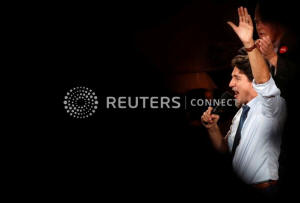Canada's Trudeau, his 'sunny ways' darkened by scandals, seeks to retain
power in election
 Send a link to a friend
Send a link to a friend
 [October 21, 2019]
By Steve Scherer [October 21, 2019]
By Steve Scherer
OTTAWA (Reuters) - Canadians vote on Monday
to determine whether Prime Minister Justin Trudeau, who swept into
office four years ago as a charismatic figure promising "sunny ways,"
will remain in power after two major scandals.
Trudeau, 47, the Liberal Party leader, was endorsed by former Democratic
U.S. President Barack Obama in the final stretch of the campaign and is
viewed as one of the last remaining progressive leaders among the
world's major democracies.
But he was shaken during the campaign by a blackface scandal and has
been dogged by criticism of his handling of a corruption case involving
a major Canadian construction company. Trudeau, the son of former
Canadian Prime Minister Pierre Trudeau, has also had to overcome a sense
of fatigue with his government.
His Liberals and the main opposition Conservatives led by Andrew Scheer
are in a neck-and-neck race, according to opinion polls.
"The truth is it's a coin toss right now," said Ipsos pollster Darrell
Bricker.

A year ago, no one would have predicted that Trudeau risked being the
first prime minister since the 1930s to secure a parliamentary majority
and then fail to win a second term.
The latest opinion polls suggest he may narrowly avert that result and
could return to office with a minority in the 338-seat House of Commons.
That would still leave Trudeau in a weakened position and needing the
support of left-leaning opposition parties Five parties are contesting
Canada’s federal election to push through key pieces of legislation.
Despite Scheer's dimpled smile, Trudeau's main rival has proven to be a
determined opponent. One of the defining moments of the campaign was
when Scheer attacked Trudeau during the English-language debate.
"He can't even remember how many times he put blackface on, because the
fact of the matter is he's always wearing a mask," Scheer said. "Mr.
Trudeau, you are a phony and you are a fraud and you do not deserve to
govern this country."
In his bid to unseat Trudeau, Scheer is also promising to balance the
federal budget and eliminate a "carbon tax" on fossil fuels. Scheer, 40,
although a career politician, is running his first campaign as party
leader after winning a bitter Conservative leadership fight in 2017.
BUMPY CAMPAIGN RIDE
The six-week official campaign period has been a rough and meandering
ride with dirty tactics on both sides.
[to top of second column]
|

Liberal leader and Canadian Prime Minister Justin Trudeau takes part
in a rally as he campaigns for the upcoming election, in Victoria,
British Columbia, Canada October 20, 2019. REUTERS/Stephane Mahe

The liberal image of Trudeau, who has championed diversity as prime
minister and whose father opened up the country to mass immigration,
took a severe blow when pictures emerged early in the campaign of
him wearing blackface in the early 1990s and in 2001.
Trudeau had already been wrestling with the fallout from accusations
he pressured his justice minister to help shield engineering firm
SNC-Lavalin Lavalin Group Inc from corruption charges. In August, a
top watchdog said Trudeau breached ethics rules.
Given the fact that neither of the front-runners could come away
with a parliamentary majority, it is the smaller left-leaning New
Democratic Party (NDP) or the separatist Bloc Quebecois that could
end up holding the balance of power.
Only six weeks ago, both those parties looked like they were heading
toward electoral disaster. But NDP leader Jagmeet Singh and the
Bloc's Yves-Francois Blanchet have won praise for campaigns in which
they cast themselves as alternatives to the leaders of the big
parties.
"I am a lifelong Liberal voter and I am stumped on this one, mostly
because I am really concerned about a Conservative win and just
trying to figure out how to vote strategically," said Kristin
Street, 33, a strategy manager at a computer games company, in Port
Moody, British Columbia.
Polls open in the Atlantic province of Newfoundland at 8:30 a.m.
(1100 GMT) and voting ends in the Pacific Coast province of British
Columbia at 7 p.m. (0200 GMT on Tuesday).
EKOS Research pollster Frank Graves said Liberals needed turnout to
be similar to four years ago or otherwise the Conservatives may have
an edge.

"We may well be waiting until the final vote tallies in British
Columbia to see who will win on Monday," Graves said.
(Reporting by Steve Scherer; Additional reporting by David Ljunggren;
Editing by Peter Cooney)
[© 2019 Thomson Reuters. All rights
reserved.]
Copyright 2019 Reuters. All rights reserved. This material may not be published,
broadcast, rewritten or redistributed.
Thompson Reuters is solely responsible for this content. |